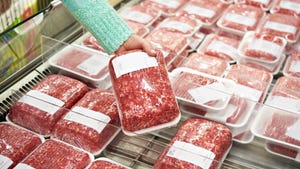Schools are bringing ag back to the classroom
Discover how schools are beefing up the lunch menu and the classroom with burgers and practical agricultural lessons.
December 31, 2018

Recently, FOX 9 in Minneapolis, Minn., featured a story about a school that had an “Adulting Day,” where high school teachers set aside a day of classes to teach life lessons including how to cook at college, how to change a tire and how to pay bills.
Does anybody think just one day is adequate to instill these important life skills in our nation’s youth? As agriculture and technical classes have been pushed out of schools in favor of standardized testing, we have shortchanged our children and their futures.
Sure, they can do algebraic formulas and provide a correct citation on their essays, but can they create a budget, prepare a meal or know how to save for things like college, a house or retirement?
In recent news, some schools are pushing back against the current curriculums that take the common sense out of the classroom. And not surprisingly, these schools are using agriculture to bring some real-world education to their local students.
What’s more, these schools are not only teaching agriculture, but they are beefing up the school lunch programs, as well. Here’s a roundup of recent stories that showcase how local communities are making agriculture cool again in their schools.
1. “The high school where learning to farm is a graduation requirement” by Mary Ann Lieser for Yes Magazine
Here’s an excerpt: “During the past decade, Olney has integrated farm work and food production into every aspect of student life, from the barn to the kitchen to the classroom. In 2015, Olney became the nation’s first USDA-certified organic campus.”
2. “Local beef in local schools” by the South Dakota Stockgrowers Association
Wall Meats in South Dakota has teamed up with the Wall School District to bring locally-raised beef to the school cafeteria. Learn more about their efforts by clicking here.
3. “Minneapolis school lunch makeover verdict: It’s working” by Jana Shortal for KARE11
Here’s an excerpt: “Nearly seven years ago, the lunch trays in the Minneapolis Public Schools started to get a makeover. They were the subject of one man’s passion to take school lunches out of the trenches of processed food and back to the whole foods they once were, way back when — real food, real farms, real flavor.”
4. “Local beef is coming soon to Burke School lunch program” published in the Tri-State Livestock News
According to the article, “Myron and Carol Johnson will join Rich and Sara Grim and Betsy Senter and Bonnie Noziska as the first donors of a beef to be processed for the Burke School Lunch Program. The Rosebud Rancherettes Cattlewomen spearheaded this unique program and the Burke School District is one of the first schools in the state to bring home-grown beef directly to the school lunch program through the use of a specially certified processor.”
5. “Clarke expanding CTE courses in agriculture, teaching” by Anna Merod for The Winchester Star
Merod writes, “Students in sixth and seventh grades at the Clarke County Public School in Virginia will now have the option to take a nine-week agriculture class as a part of their other nine-week rotations in art, career explorations and introduction to technology classes. Sixth graders can take an introduction to agri-science class, and seventh graders can take agri-science exploration.”
These stories are encouraging to see, and I hope others follow suit in the years to come. With the USDA loosening the reins on school lunch requirements, there is more flexibility for local school districts to tailor their menus to meet the needs of their students.
A greater challenge may be getting agriculture into the curriculum, but there are so many great resources out there to share with local teachers. I encourage everyone to utilize their local Agriculture in the Classroom organizations to help provide lesson plans to teachers that incorporate agriculture into core subjects they are required to teach.
The opinions of Amanda Radke are not necessarily those of beefmagazine.com or Farm Progress.
About the Author(s)
You May Also Like





